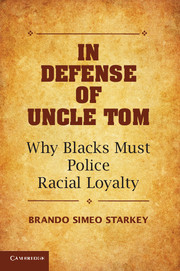Book contents
- Frontmatter
- Dedication
- Contents
- Acknowledgments
- Introduction
- 1 Solidarity, Social Norms, and Uncle Tom
- 2 Uncle Tom: 1865–1959
- 3 The Unwitting Pioneers
- 4 Uncle Tom: 1960–1975
- 5 No Man Was Safe
- 6 Uncle Tom Today: 1976–Present
- 7 So What About Clarence?
- 8 The Curious Case of Uncle Tom
- 9 What Now, Uncle Tom?
- Final Address
- Index
- References
8 - The Curious Case of Uncle Tom
Published online by Cambridge University Press: 05 May 2015
- Frontmatter
- Dedication
- Contents
- Acknowledgments
- Introduction
- 1 Solidarity, Social Norms, and Uncle Tom
- 2 Uncle Tom: 1865–1959
- 3 The Unwitting Pioneers
- 4 Uncle Tom: 1960–1975
- 5 No Man Was Safe
- 6 Uncle Tom Today: 1976–Present
- 7 So What About Clarence?
- 8 The Curious Case of Uncle Tom
- 9 What Now, Uncle Tom?
- Final Address
- Index
- References
Summary
Black Conservatives – The New Uncle Toms
The burn of just oneUncle Tom accusation is agonizing. To endure prolonged exposure to the epithet as has Clarence Thomas is a harrowing experience known to but a few. One might imagine the agony being so acute that he commiserates with his similarly afflicted kin: black conservatives. Like Thomas, they insist that they have been wronged. And many are right. Conservative ideology, like conservative jurisprudence, should not place adherents directly in the fire. As always, the key inquiry is whether the person defied constructive norms. The burn black conservatives endure is sometimes defensible, although not for the typical reasons.
The black right comprises a deep pool of intellectual thought, including a viewpoint holding that antiblack attitudes, discrimination, institutional racism, and structural inequalities have no appreciable effect on blacks’ lives and thus are unworthy of much attention. Discrimination against whites, however, namely affirmative action, is a scourge on society, requiring an immediate cure and constant discussion. That is, some black conservatives insist that whites, not blacks, are the true casualties of racial injustice.
But this viewpoint is erroneous. Blacks should debate the seriousness of racism - overt, covert, and unconscious – and structural inequality. And some might contend that blacks would fare best by focusing solely on self-help measures and ignoring protest activities. Such views do not signal betrayal. Those denying the salience of racism in all of its many forms, however, are likely, although not certainly, cooperating with antiblack interests.
- Type
- Chapter
- Information
- In Defense of Uncle TomWhy Blacks Must Police Racial Loyalty, pp. 279 - 320Publisher: Cambridge University PressPrint publication year: 2015



